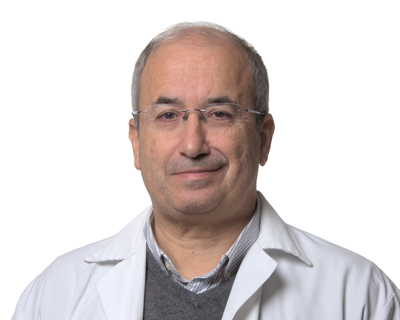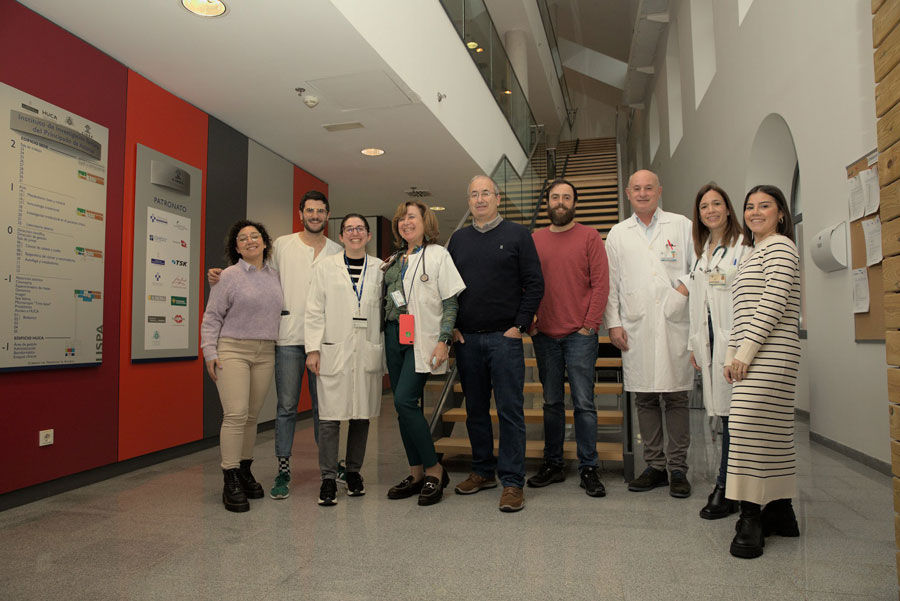JEFE DE UNIDAD
Segundo González Rodríguez
UBICACIÓN Y CONTACTO
Facultad de Medicina, 4º planta, Lab.21, Julián Clavería sn, 33006, Oviedo. Spain.
segundog@uniovi.es

LÍNEAS DE INVESTIGACIÓN
El grupo de Inmunología Tumoral está centrado en el estudio de la respuesta inmunitaria contra el cáncer y en especialmente en la respuesta mediada por células Natural Killer (NK) y linfocitos T.
Estudio de la respuesta inmunitaria mediada por células NK y linfocitos T.
Papel de la respuesta inmunitaria en la patogenia del cáncer. Estudio de los mecanismos de evasión inmunitaria del cáncer.
Papel de la respuesta inmunitaria en la patogenia de la leucemia linfática crónica y mieloma múltiple.
Desarrollo de nuevas estrategias inmunoterapéuticas en cáncer.
Desarrollo preclínico de nuevos compuestos antitumorales con propiedades inmunoterapéuticas: En colaboración con diversas empresas farmacéuticas, como EntreChem, Celgene, Boehringer Ingelheim o Bristol-Myers Squibb, nuestro grupo está participando en el desarrollo preclínico de diversos fármacos antitumorales con potencial inmunoterapéutico.
BIOGRAFÍA DEL JEFE DE GRUPO:
Segundo González Rodríguez es Catedrático de Inmunología de la Universidad de Oviedo. Es el investigador principal del Grupo de Inmunología Tumoral perteneciente al Instituto de Investigación Sanitaria del Principado de Asturias (ISPA). Es Doctor en Medicina y Especialista en Inmunología (vía MIR). Fue investigador clínico y postdoctoral en el Servicio de Inmunología del Hospital Universitario Central de Asturias y del laboratorio Dr. Thomas Spies. Clinical Research Division. Fred Hutchinson Cancer Research Center USA. Ha publicado más de 140 publicaciones relacionadas con la inmunología, el trasplante, la autoinmunidad, la respuesta inmunitaria contra el cáncer y la inmunoterapia con un índice de Hirsch agregado h=42. Es editor del libro de Inmunología más vendido en castellano y de la revista Cancers (Basel) y de otras revistas internacionales relacionadas con la inmunología
PUBLICACIONES SELECCIONADAS
- Mechanisms of apoptosis resistance to NK cell-mediated cytotoxicity in cancer. Sordo-Bahamonde C, et al. International Journal of Molecular Sciences. 2020 May; 21(10): 3726
- Mechanisms of Resistance to NK Cell Immunotherapy. Sordo-Bahamonde C, et al. Cancers (Basel). 2020 Apr 7;12(4)
- The mithralog EC-7072 induces chronic lymphocytic leukemia cell death by targeting the B- cell receptor signaling pathway. Lorenzo Herrero S, et al; Christian Sordo Bahamonde; Frontiers in Immunology 2019. Oct 18;10:2455. eCollection 2019
- NK Cells in the Treatment of Hematological Malignancies. Gonzalez-Rodriguez Ana P, et al. Journal of clinical Medicine.2019 Sep 27;8(10):1557
- Selective and potent CDK8/19 inhibitors enhance NK cell activity and promote tumor surveillance. Hofmann MH, et al. Molecular Cancer Therapeutics, 2020 Apr;19(4):1018-1030
- Daratumumab is a safe and effective rescue therapy for multiple myeloma patients who relapse after allo-HSCT. González-Rodríguez AP, et al. Bone Marrow Transplantation. 2019. Apr 15
- Ig-like transcript 2 (ILT2) blockade and lenalidomide restore NK cell function in Chronic Lymphocytic Leukemia. Villa-Álvarez M, et al. Frontiers in Immunology, 2018 Dec 28;11(1)
- NK cell-based immunotherapy in cancer metastasis. Lorenzo-Herrero S, et al. Cancers (Basel) 2018 Dec 28;11(1)
- NK cells editing mediates epithelial to mesenchymal transition via phenotypic and proteomic changes in melanoma cell lines. Huergo Zapico L, et al. Cancer Research 2018. May 11. pii: canres.1891.2017
- Control of metastasis by NK cells.López-Soto A, et al. Cancer Cell. 2017 Aug 14;32(2):135-154
- Ig-like transcript 2 (ILT2) suppresses T cell function in Chronic Lymphocytic Leukemia. Villa-Álvarez M, et al. Oncoimmunology 2017;6(10):e1353856
- Drug-induced Hyperploidy stimulates an anti-tumor NK cell response mediated by NKG2D and DNAM-1 receptors. Acebes-Huerta A, et al.Oncoimmunology 2015 Aug 12;5(2):e1074378
- NKG2D signaling: the immune subversive side of HDAC3. Folgueras AR et el. Trends in Immunology 2017 TREIMM 1352
- Carcinoma-astrocyte gap junctions promote brain metastasis by cGAMP transfer. Qing Chen; Adrienne Boire; Xin Jin; Manuel Valiente; EkremEmrahEr; Alejandro Lopez Soto; Leni S Jacob; RuzeenPatwa; Hardik Shah; Ke Xu; Justin R Cross; Joan Massagué.Nature. 2016; 7604: 493-501
- Epithelial-to-mesenchymal transition stimulates anti-tumor response mediated by NKG2D receptor. López-Soto A, et al. Journal of Immunology 2013, 190: 4408-4419
- Expression of ERp5 and GRP78 on the membrane of chronic lymphocytic leukemia cells: Association with soluble MICA shedding. Huergo-Zapico L, et al. CancerImmunology Immunotherapy. 2012; 61(8):1201-10
- Histone deacetylase 3 is a repressor of the NKG2D ligands UL16-binding proteins in epithelial tumor cells. Potential implications for the immunosurveillance of cancer. A. López Soto, et al. Oncogene. 2009; 28(25):2370-82
- Disulfide isomerase-enabled shedding of tumorur-associating NKG2D ligands.BK. Kaiser I-Ting Chow, D Yim, Segundo Gonzalez, Z Dai, HH Man , RK. Strong, V Groh & T Spies. Nature 2007; 447(7143):482-486

Miembros
| Nombre | Cargo | Teléfono | |
| Segundo González Rodríguez | Jefe de grupo | segundog@uniovi.es | 985102715 |
| Alejandro López Soto | Profesor Ayudante | lopezsoa@gmail.com | 985105211 |
| Ana González Rodríguez/td> | Hematóloga (FEA). HUCA. | anapilargonzalez@gmail.com | 626043623 |
| Ángel Ramírez Payer | Jefe de Sección de Hematología. HUCA. | apayer.angel@gmail.com | 629224749 |
| María Esther González García | Hematólogo (FEA). Hospital Cabueñes | esthergongar@yahoo.es | 985102715 |
| Seila Lorenzo Herrero | Investigadora postdoctoral | lorenzoseila@uniovi.es | 985105211 |
| Christian Sordo Bahamonde | Investigador predoctoral (Severo Ochoa) | uo180231@uniovi.es | 985105211 |
| Mónica Villa Álvarez | Doctoranda | hobbitie@hotmail.com | 985105211 |

